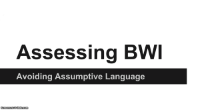Biblical worldview
-
The Renewanation Review magazine
"… a full-color magazine filled with insightful articles that present and defend biblical worldview and the importance of training the next generation to know, love, and serve Christ."
-
A Christian worldview: Putting on our spiritual armor
By Nancy Pearcey, PBU Today, Summer 2007, p. 8-11
We typically hear Christians say that the Bible is the authoritative source of truth for faith and morals. But we don’t always hear Christians say that the Bible gives a framework for the rest of knowledge as well—for law and politics, for business and economics, for the arts and humanities.
-
Assessing Biblical Worldview Integration
 Scott Hayden at the International Community School in Thailand has been instrumental in helping the school think about developing discerning thinkers.
Scott Hayden at the International Community School in Thailand has been instrumental in helping the school think about developing discerning thinkers.He has very helpful examples of the importance of avoiding assumptive language—a very real problem, especially when assessing students. An important part of the power of education to shape thinking is the assumptive language of the teacher, but it is easy to misuse the power to coerce responses rather than allow individual choice. In all environments, it is easy to misuse the power of teachers to get students to say what the teacher wants them to say. As Christians, we want students to know and love God through Jesus Christ and in the power of the Holy Spirit unselfishly love others. However, producing “marks Christians” doesn’t honor the God who graciously and humbly allows personal choice even though the majority of His creation reject His love.
Especially in a mixed environment where there is a very wide range of perspectives on Biblical truth, it is important to consider the words that we use. Many teachers find themselves in an environment hostile to the overt presentation of truth, but this video not only points them away from pitfalls, but towards new opportunities for truth to be considered. Christians should be interested in critical and discerning thinking because of our understanding of God’s image in all people. We, of all people, should promote the development of the God-given gifts of logic, understanding and communication. Asking the right kind of questions can open rather than close consideration of controversial ideas.
-
BibleThinker
"Helping you learn to think Biblically about everything"
-
Biblical Christian World View: Mathematical Circles
James Nickel writes short essays “with the goal of unveiling the vistas and power of mathematics as seen through Biblical Christian eyes”
-
BJU Press for schools
"…provides educational materials written from a biblical worldview that focus on academic rigor and encourage critical thinking—all supported by appropriate educational technology."
-
Bridge Building: Guidelines for Biblical Worldview Integration
 Scott Hayden at the International Community School in Thailand lead a year of conversation during the 2012-13 school year about Biblical worldview integration.
Scott Hayden at the International Community School in Thailand lead a year of conversation during the 2012-13 school year about Biblical worldview integration.“Teaching a Biblical worldview to students of other faiths can feel like spanning a divide between two continents. Consider worldview building–Bridge Building. You are not preaching the gospel or giving invitations in academic courses but you are making a way for them to visit, understand, and appreciate a significant alternative way to see the world.”
At the end of the 13:22 presentation, you will be challenged to consider:
- What's immediately useable?
- What's got potential?
- What's debatable?
Members of this website can post their comments below.
-
CEI - Christian Education Initiative
"…advancing the cause of biblical Christian education in K-12 education, including college students and adults"
-
Center for Biblical Worldview
"The mission…is to equip Christians with a biblical worldview and train them to advance and defend the faith in their families, communities, and the public square."
-
Christian Perspective: Biblical Math
Resources from a Christian perspective (i.e., a biblical worldview), collected by Katherine Loop
-
Colson Educators
A collaboration between the Colson Center, ACSI, International Alliance for Christian Education and Gilbert Christian Schools which provides free courses on worldview formation.
-
Edu Deo Ministries
"…a Canadian, Christian, mission organization serving children in developing countries with quality education rooted in a Biblical worldview"
-
Education or Transform-ED - PPT

Everyone seems to believe that education is the way to bring about positive change in the world. Education that makes a difference—transformational education—is a highly desirable commodity. Training, instruction and nurture are 3 dimensions of education, but having all 3 present and in balance is a lot easier said than done. This video explores what is needed for education to fulfill its promise of positive change as it becomes Transform-ED.
You can watch an Office Mix which considers various similies we use to describe what the Bible is like and their implications for Biblical integration. It is also possible to download a video of the presentation.
The PowerPoint slides were designed by Sandy Strukoff.
-
Foundation Worldview
"…a Comparative Worldview Curriculum for kids and teens" because "…the Christian youth exodus doesn't begin with teens, it begins with kids."
-
iLumenEd Academy
"Serving grades K-12" with a vision "to transform our culture by giving millions of children a biblical worldview"
-
Increase meaning: A wholistic approach to Christian education
An on-line course "for Christian teachers, school principals and others who want to impart a greater sense of meaning and purpose to students of all ages”
-
Is there such a thing as teaching Christianly?
By Steven Levy on www.cace.org, May 22, 2019
 There is power in the naming of things. I imagine that when God gave Adam the task of naming the animals, Adam didn’t just think up sounds for what to call them. He connected with the genius of what God made each creature to be, and out of Adam’s discernment of “Christ in all things,” each name came forth from his lips. A true name reveals the essence of a thing. It’s a truth more than a label, claiming its perfect place in the Logos.
There is power in the naming of things. I imagine that when God gave Adam the task of naming the animals, Adam didn’t just think up sounds for what to call them. He connected with the genius of what God made each creature to be, and out of Adam’s discernment of “Christ in all things,” each name came forth from his lips. A true name reveals the essence of a thing. It’s a truth more than a label, claiming its perfect place in the Logos.I love it when authors name things for me, things that I have known deep in my bones…but not in my mind. Like a blind man, I’ve felt its contours, its texture, it’s temperature, but never quite brought it into full light. The author names a feeling, a connection, an insight, a revelation, and that’s it! A blinding flash of the obvious!
-
LifeWorld Education
“All education is a deeply theological activity. The outcome will depend on which God you believe owns truth and the effectiveness of your methods”
-
Morality and the irrationality of an evolutionary worldview
By Dr. Georgia Purdom and Dr. Jason Lisle in February 9, 2016 Renewanation
 Morality is a very difficult problem for the evolutionary worldview. This is not to say that evolutionists are somehow less moral than biblical creationists—or anyone else. Most evolutionists adhere to a moral code and believe in the concept of right and wrong. But evolutionists have no rational reason for this position. Thus, only creationists have a rational, logical, and consistent reason for morality.
Morality is a very difficult problem for the evolutionary worldview. This is not to say that evolutionists are somehow less moral than biblical creationists—or anyone else. Most evolutionists adhere to a moral code and believe in the concept of right and wrong. But evolutionists have no rational reason for this position. Thus, only creationists have a rational, logical, and consistent reason for morality. -
Nancy Pearcey - Biblical principles work better
"“Having a Christian worldview means being utterly convinced that biblical principles are not only true but also work better in the grit and grime of the real world.”
Nancy Pearcey
